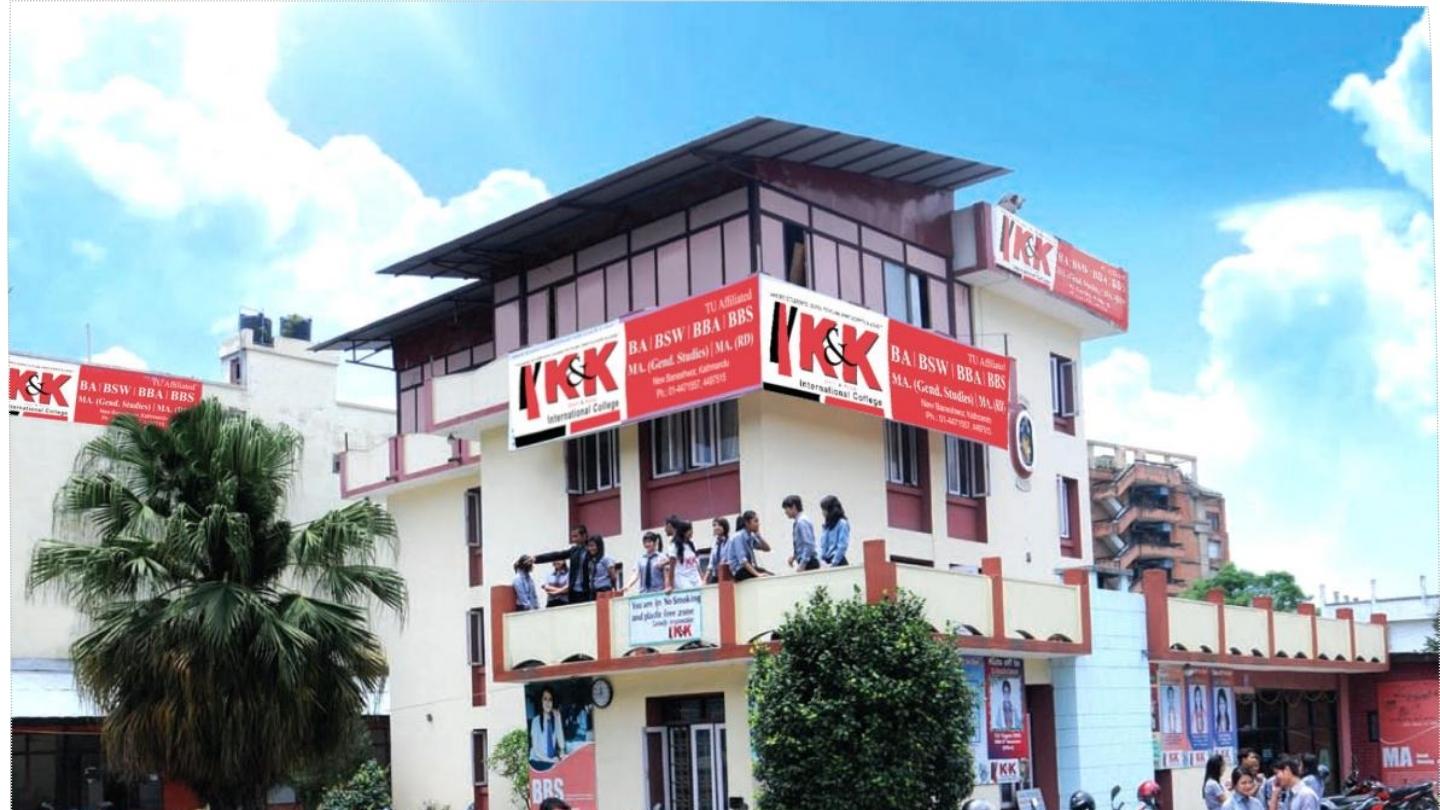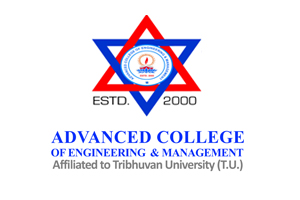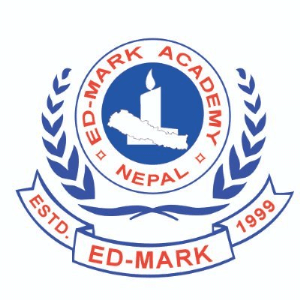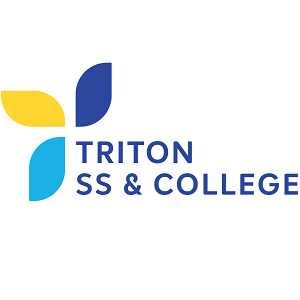Overview
BCA at K and K International College, New Baneshwor, Kathmandu
The Bachelor of Computer Application (BCA) at K and K International College (K&K), New Baneshwor, runs under Tribhuvan University’s Faculty of Humanities and Social Sciences.
The program follows an eight-semester structure totaling 126 credits. Students study core computing, programming, database, networking, web technology, software engineering, computer ethics, and supporting papers in mathematics, statistics, management, and communication. Three staged projects and a supervised internship give you documented, practice-based work that supports early employment or further study.

Overview with Introduction
This BCA profile focuses on clear, verifiable details that matter to you before applying. The curriculum structure, evaluation norms, and semester rhythm follow Tribhuvan University rules for BCA. K&K delivers the program within that framework, providing a computer lab, library access, and scheduled classrooms that help you complete programming tasks, project milestones, and practical assessments on time.
Highlights
-
Program length: Four academic years, eight semesters
-
Total credits: 126 (core computing, supporting papers, electives, projects, internship)
-
Projects: Three staged projects that build from foundational coding to a larger application
-
Internship: Supervised placement with a written report and presentation
-
Assessment: Internal work plus TU examinations; practical components attached to several computing papers
-
college support: Computer lab, library terminals, multimedia classrooms, and scheduled student activities in New Baneshwor (opposite BICC)
Curriculum Details
The BCA spreads 126 credits across computing foundations and related subjects so that you develop both technical depth and essential academic skills.
Computing Core
Students cover computer fundamentals, digital logic, microprocessors, data structures and algorithms, object-oriented programming, web technology, database management systems, operating systems, software engineering, scripting, networking, mobile programming, distributed systems, MIS and e-business, computer graphics, cloud computing, cyber law and professional ethics, and operations research. The sequence moves from basic computing and programming to systems-level topics, networking, and applications.
Supporting Papers
Mathematics (I and II), probability and statistics, financial accounting, applied economics, management fundamentals, English composition, and society-and-technology give you the background needed to read documents, interpret data, and write project reports.
Projects and Internship
-
Project I: A small application that demonstrates basic programming and documentation.
-
Project II: A mid-level build with simple design documents, version tracking, and testing notes.
-
Project III: A larger application or system component with formal presentation and defense.
-
Internship: A supervised placement in a host organization, followed by a written report and viva/presentation.
Assessment pattern: Internal activities (assignments, lab work, quizzes, mid-terms, practicals, and presentations) plus TU board exams. Several computing papers carry practical components, so lab performance and report quality matter throughout the degree.
Objectives
The BCA aims to help students:
-
Write maintainable code in a high-level language and apply core algorithms to real tasks.
-
Model and store data using standard database concepts and query languages.
-
Understand networks well enough to configure basic services and reason about performance and security.
-
Plan small projects with simple documents that explain scope, milestones, and testing.
-
Practice ethical conduct in software use, data handling, and documentation during projects and internship.
Scope
Graduates pursue roles that use programming, database, and support skills. Typical starting titles include junior developer, web developer, QA trainee, database assistant, IT support, and networking assistant. Some graduates join small teams where they handle multiple tasks across front-end, back-end, and deployment with guidance from seniors. Others move into further study in computing or management after building a year or two of experience.
Learning Outcomes
By graduation, students typically can:
-
Develop a small application that reads, processes, and stores data with basic error handling.
-
Use data structures, algorithms, and SQL to solve common problems.
-
Test code with simple unit or functional checks and write a short test report.
-
Deploy a basic web application and document the steps and dependencies.
-
Explain security and ethics concerns in everyday computing tasks and apply safe practices.
Skill Development Modules
Coursework encourages steady practice in programming, documentation, and teamwork. Instructors share a course plan each semester outlining internal activities and due dates. The college supports this routine with lab hours and access to reference materials.
Micro-checklist for technical growth
-
Daily coding: Write 30–60 minutes of code or problem sets.
-
Version control: Commit frequently with clear messages.
-
Reading log: Summarize one concept note or API page each week.
-
Peer review: Exchange code with a classmate and give two specific suggestions.
-
Demo habit: Record a two-minute screen demo of your feature at each milestone.
Teaching Methodology
Classes balance short explanations with worked examples and lab sessions. A typical week includes lecture, guided exercises, and in-lab programming. Internal evaluation may include lab records, assignments, quizzes, practical tests, presentations, and a mid-term. Group work appears in projects where you split tasks into backend, frontend, database, or documentation roles. You learn to keep a project log that lists goals, progress, issues, and next steps.
Admission Requirements
-
Eligibility: Completion of grade 12 or equivalent from a board recognized by Tribhuvan University; documents must confirm subjects taken and grades/division.
-
Selection: K&K follows TU rules for BCA admissions and may schedule screening or counseling during intake.
-
Documents: Mark sheets and character certificates for grades 10, 11, and 12; recent photos; a valid ID; and any additional forms announced for the current cycle.
Before you apply
-
Collect records: Keep scanned copies of mark sheets, ID, and photos.
-
Track notices: Note K&K submission dates and any screening schedule.
-
Organize files: Store receipts and acknowledgments in one digital folder.
-
Prepare basics: List any prior coding exposure or small projects you can discuss during counseling.
Career Opportunities
Entry paths include software development (junior), web development, QA/testing, database support, and network assistance. Small firms may ask you to work across setup, coding, testing, and documentation. Larger firms often split roles more narrowly, so your internship report and final project help teams understand your strengths. Students aiming for graduate study can use these documents and faculty references when applying.
Early portfolio ideas
-
Utilities: A command-line or small GUI tool that solves a repeated task.
-
Web app: A CRUD application with authentication and basic validation.
-
Data task: A script that cleans a CSV file and produces a short summary with charts.
-
Network note: A brief lab report showing a service setup and simple tests.
Scholarships and Financial Aid
Scholarship notices are issued during admission. Categories may include merit and need-based support under published rules. Prepare the documents commonly requested—citizenship or ID, grade sheets, and any supporting letters—to avoid delays. Track the college calendar for deadlines and interviews, and apply early to meet form-submission windows.
Why Choose BCA?
Students who want a structured, practice-oriented computing degree find BCA manageable and clear. The eight-semester rhythm encourages continuous coding and small deliverables. Staged projects document your growth from simple scripts to a larger application.
The internship gives you a supervised setting where you follow workplace norms, write a report, and present your work. The New Baneshwor location near BICC helps with daily travel, and college facilities—lab access, library terminals, and scheduled classrooms—support consistent study and timely submissions.
Conclusion
The BCA at K&K follows Tribhuvan University’s rules from admission to graduation. You study computing foundations, complete three projects, and finish a supervised internship with a written report. A steady routine—regular coding, careful documentation, and on-time submissions—prepares you for entry-level roles or further study. If you keep records of code, tests, and reflections each semester, you graduate with a portfolio that shows clear progress and usable skills.
FAQ
What is the total credit requirement for BCA?
126 credits completed over eight semesters.
Do computing papers include practical components?
Yes. Several courses carry practical work and lab records as part of internal evaluation.
How are projects organized across the degree?
Three staged projects progress from a small build to a larger application, each with documentation and presentation.
Is there an internship?
Yes. A supervised placement requires a written report and a viva/presentation.
Which facilities support BCA study on college?
A computer lab, library terminals for e-resources, multimedia classrooms, and scheduled student activities in New Baneshwor (opposite BICC).






















